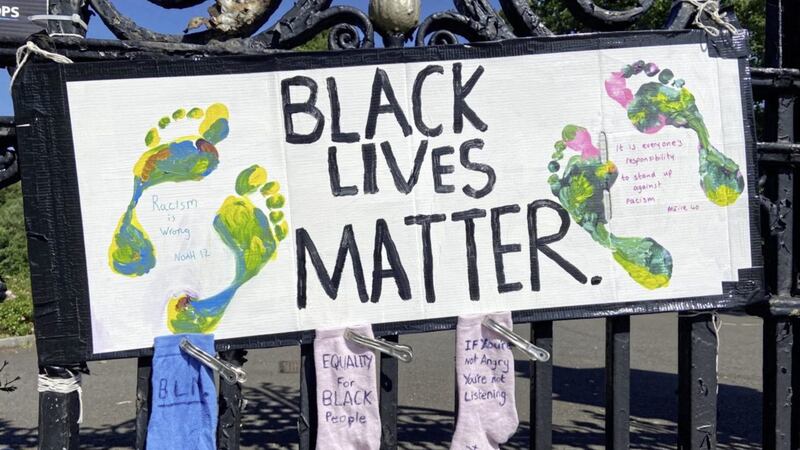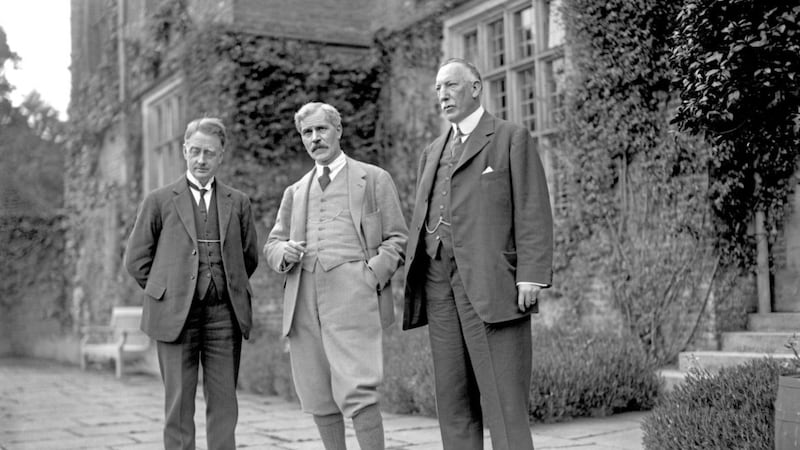Lisburn town council has voted that it “stands with the Black Lives Matter movement”, but only after a UUP amendment removed mention of the Black Lives Matter movement.
This is a triumph of peace process politics - higher standards will require a fundamental rethink.
Among DUP objections to the original motion, proposed by Alliance, were that Black Lives Matter is “anti-family” and “far left”. Abortion was also mentioned. Armagh, Banbridge and Craigavon Council had a debate along similar lines.
A half-forgotten but suddenly pertinent detail of recent history is that ‘identity politics’, for want of a better term, was imported into Northern Ireland from the early 1980s by unionist thinkers, for want of a better term. Their intention was to modernise our politics along American lines, with themselves as the religious right, or at least the conservative right.
The notion continues tripping unionists up to this day, including those barely aware they subscribe to it.
**
One way to raise standards would be to establish where the fury threshold really lies.
The Belfast Telegraph reported “unionist anger” after republican group Lasair Dhearg put up home-made street signs around Belfast. However, the only unionist quoted was councillor Jim Rodgers, suspended from the UUP last year over a leaflet linking Alliance to the IRA.
The general reaction to the signage stunt was hilarity. Lasair Dhearg is fast acquiring cult comedy status and it is not entirely certain this is unintentional.
**
“I am deeply concerned at the emphasis on growth. Why must the economy always be at the centre of every discussion? Will the minister, please, continue to be brave enough to implement the actual change that is needed to halt the breaking down of the climate?”
This is what Clare Bailey asked DUP environment minister Edwin Poots during an assembly debate.
The Green Party leader in Northern Ireland was fortunate the chamber was quiet due to social distancing, or she might have been greeted with gales of derision.
As she spoke, frustration was coming to a head in the Republic over the northern greens jeopardising the draft new coalition, with Bailey switching from abstaining to opposing it. Her objection was that the deal was “fiscally conservative”, despite offering “environmental wins.”
In other words, it put too much emphasis on the climate and not enough on growth.
**
A striking aspect of the row over the Troubles pension is how determined Sinn Féin and the DUP are not to have a public falling out over it. Other parties protested when free school meals over the summer were not signed off due to the pensions deadlock. The DUP bit its tongue and Sinn Féin, while blaming the DUP, nevertheless played the matter down, portraying it as a routine case of a meeting over-running.
Both parties have been at loggerheads over the pension since devolution was restored in January but they kept it out of the headlines until March, then tried to present it as a financial dispute between Stormont and Westminster.
If only this new spirit of accommodation could be extended to actually solving the problem.
**
There will be no appeals process for predicted GCSE and A-level grades, the Council for the Curriculum, Examinations and Assessments has announced.
The Children’s Commissioner has said this decision must be overturned and the council would be wise to comply, as it will certainly lose in the inevitable event of a student seeking a judicial review.
If there is one thing a judge can be certain to rule, it is that a verdict-delivering process must have a proper appeal mechanism. Presumably, the psychology behind this is ‘if even I can be appealed, so can you’.
**
The rates and rules for MLAs’ salaries, pensions and expenses are overseen by the Independent Financial Review Panel (IFRP), set up in 2011 to defuse public indignation at politicians giving themselves a raise.
Now the assembly commission, run by the five main parties, is proposing to split these functions, leaving salaries and pensions with a new independent panel and taking on expenses itself.
The commission is keen to emphasise its “consensus” that MLAs should not be setting their own pay, which was the original reason for independent oversight.
What the commission is not mentioning is the 2014 scandal over office rents, revealed by BBC Spotlight, which shifted the emphasis of IFRP’s role onto expenses and attempting to close loopholes.
To claim pay and pensions are the main concern and expenses are a sideshow is highly misleading. The opposite is the case.
**
The Chinese consulate in Belfast has been in dispute with the council and Malone Road residents over an unapproved security wall. Earlier this month, the council obtained an injunction from the High Court for building work to cease.
The consulate’s lawyers have now written back to residents saying “our client does not accept the jurisdiction of the courts.”
China’s diplomats are famously well informed. Can they be unaware of the local resonance of saying they do not recognise the court?









